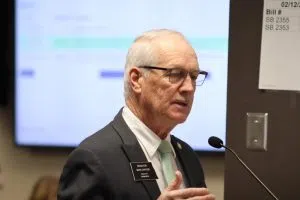 (Mary Steurer -North Dakota Monitor) – A group of public school-related bills in the North Dakota statehouse could test the limits of the First Amendment’s Establishment Clause — the part of the U.S. Constitution that says the government may not establish a national religion.
(Mary Steurer -North Dakota Monitor) – A group of public school-related bills in the North Dakota statehouse could test the limits of the First Amendment’s Establishment Clause — the part of the U.S. Constitution that says the government may not establish a national religion.
Supporters of the bills have said the proposals do not promote one religion over another, and therefore don’t pose a threat to First Amendment rights. Instead, they say the bills uphold constitutional rights by allowing students and teachers more freedom to express their beliefs.
Two of the bills are backed by national groups pushing to make the proposals law in states across the country, testimony shows.
Opponents of the bills aren’t convinced the measures pass constitutional muster. They say the bills present serious freedom of religion concerns and would get the state sued.
“We have a lot of bills this session that are walking that fine line of the Establishment Clause,” Aimee Copas, executive director of the North Dakota Council of Educational Leaders, told lawmakers in a Tuesday hearing on House Bill 1456, which would allow public schools to hire chaplains.
Rep. SuAnn Olson, R-Baldwin, the primary sponsor of House Bill 1456, said chaplains are good for school communities and would support the wellbeing of students and teachers.
“Chaplains fill critical gaps in mental health care, foster character development, enhance safety by operating proactively and offer invaluable support during crises,” she told lawmakers. Other supporters of the measure said chaplains are trained to serve people from all spiritual backgrounds, not to proselytize.
The bill was supported by outside groups including the National School Chaplain Association and the Put On Your Armor Foundation.
It originally set aside $500,000 to fund the hiring of school chaplains, but lawmakers voted to strip that funding from the proposal. Schools can already legally have chaplains serve their communities.
Cody Schuler, advocacy manager for the ACLU of North Dakota, told the House Education Committee on Tuesday that courts have ruled against proposals like House Bill 1456.
Courts have found that the government can only pay for chaplains when necessary to accommodate the religious rights of people who can’t access them on their own, like in prisons, hospitals and the military, he said. The government can also hire chaplains to fulfill certain ceremonial duties, like in Congress.
“Neither circumstance applies to public schools,” Schuler said.
The school chaplains bill was forwarded to the full House floor this week without any recommendation.
A second bill, which was heard by the Senate Education Committee on Wednesday, would allow science teachers to teach intelligent design, the idea that the universe was made by an intelligent being.
Advocates for Senate Bill 2355 called intelligent design a scientific theory — not a religious belief — and said it ought to be presented in science classrooms as an alternative to evolution.
“This bill has nothing to do with religion, but everything to do with continuing the search for truth,” primary sponsor Sen. Mike Dwyer, R-Bismarck, said during the hearing.
House Majority Leader Mike Lefor and Senate Majority Leader David Hogue also are co-sponsors of the bill.
David Ronderos, an associate biology professor at the University of Mary and neuroscientist, spoke against the bill on Wednesday.
He accused the bill of “pitting faith against science.” He said he’s religious, but that intelligent design isn’t supported by evidence and has no place in a science class.
A federal judge in 2005 ruled that teaching intelligent design in public school science classes is a violation of the First Amendment.
The Senate Education Committee hasn’t taken action on Senate Bill 2355.
House Bill 1145, which failed on the House floor Wednesday, would have required Ten Commandments to be posted in at least one cafeteria in every public K-12 school and higher education institution. The bill’s primary sponsor was Rep. Jeff Hoverson, R-Minot.
Boosters of the proposal say the religious doctrine is embraced by many faiths and is an important part of the United States’ cultural heritage.
“They represent a foundation for religious and societal harmony that all countries and peoples desire,” Mark Jorritsma, executive director of North Dakota Family Alliance, said in written testimony in favor of the bill.
A fiscal note attached to House Bill 1145 said defending the proposal in court “is difficult to predict” but could cost between several hundred thousand dollars to over a million dollars. The other two bills don’t have fiscal notes at this time.
National organizations WallBuilders and the First Liberty Institute supported the Ten Commandments bill and similar proposals in state legislatures around the country.









